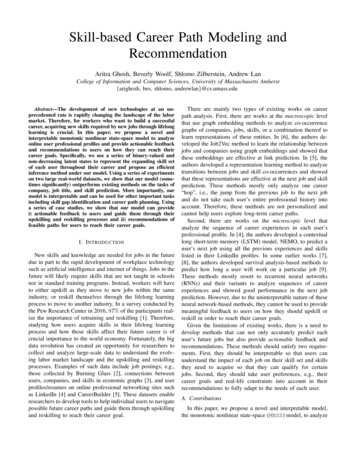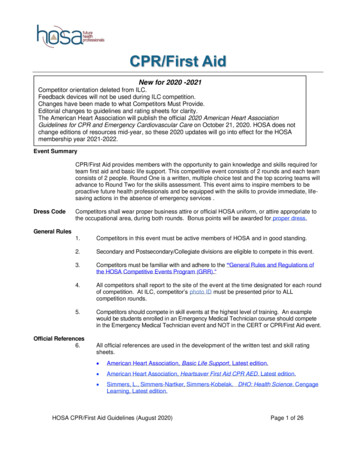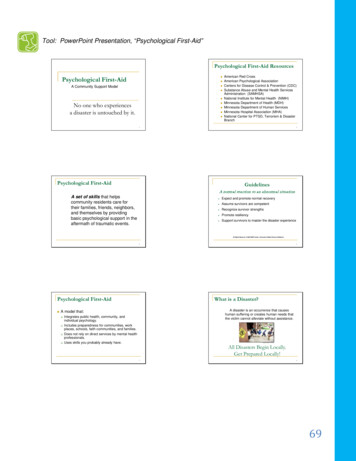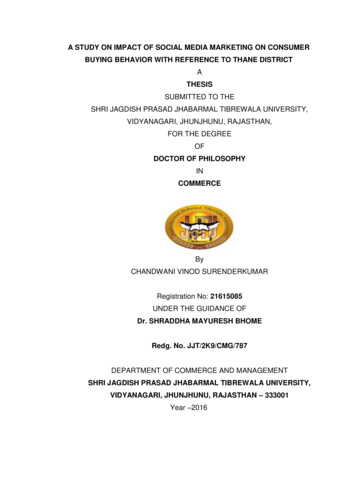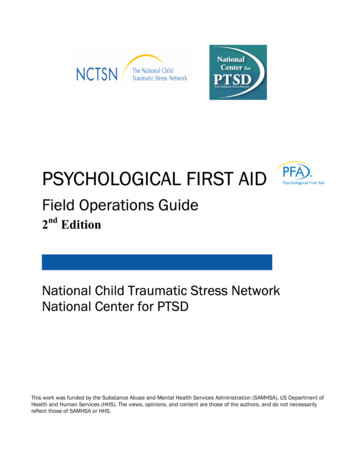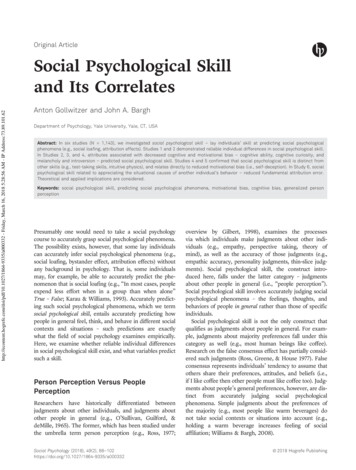
Transcription
Original /1864-9335/a000332 - Friday, March 16, 2018 5:28:56 AM - IP Address:73.89.101.62Social Psychological Skilland Its CorrelatesAnton Gollwitzer and John A. BarghDepartment of Psychology, Yale University, Yale, CT, USAAbstract: In six studies (N 1,143), we investigated social psychological skill – lay individuals’ skill at predicting social psychologicalphenomena (e.g., social loafing, attribution effects). Studies 1 and 2 demonstrated reliable individual differences in social psychological skill.In Studies 2, 3, and 4, attributes associated with decreased cognitive and motivational bias – cognitive ability, cognitive curiosity, andmelancholy and introversion – predicted social psychological skill. Studies 4 and 5 confirmed that social psychological skill is distinct fromother skills (e.g., test-taking skills, intuitive physics), and relates directly to reduced motivational bias (i.e., self-deception). In Study 6, socialpsychological skill related to appreciating the situational causes of another individual’s behavior – reduced fundamental attribution error.Theoretical and applied implications are considered.Keywords: social psychological skill, predicting social psychological phenomena, motivational bias, cognitive bias, generalized personperceptionPresumably one would need to take a social psychologycourse to accurately grasp social psychological phenomena.The possibility exists, however, that some lay individualscan accurately infer social psychological phenomena (e.g.,social loafing, bystander effect, attribution effects) withoutany background in psychology. That is, some individualsmay, for example, be able to accurately predict the phenomenon that is social loafing (e.g., “In most cases, peopleexpend less effort when in a group than when alone”True – False; Karau & Williams, 1993). Accurately predicting such social psychological phenomena, which we termsocial psychological skill, entails accurately predicting howpeople in general feel, think, and behave in different socialcontexts and situations – such predictions are exactlywhat the field of social psychology examines empirically.Here, we examine whether reliable individual differencesin social psychological skill exist, and what variables predictsuch a skill.Person Perception Versus PeoplePerceptionResearchers have historically differentiated betweenjudgments about other individuals, and judgments aboutother people in general (e.g., O’Sullivan, Guilford, &deMille, 1965). The former, which has been studied underthe umbrella term person perception (e.g., Ross, 1977;Social Psychology (2018), 49(2), verview by Gilbert, 1998), examines the processesvia which individuals make judgments about other individuals (e.g., empathy, perspective taking, theory ofmind), as well as the accuracy of those judgments (e.g.,empathic accuracy, personality judgments, thin-slice judgments). Social psychological skill, the construct introduced here, falls under the latter category – judgmentsabout other people in general (i.e., “people perception”).Social psychological skill involves accurately judging socialpsychological phenomena – the feelings, thoughts, andbehaviors of people in general rather than those of specificindividuals.Social psychological skill is not the only construct thatqualifies as judgments about people in general. For example, judgments about majority preferences fall under thiscategory as well (e.g., most human beings like coffee).Research on the false consensus effect has partially considered such judgments (Ross, Greene, & House 1977). Falseconsensus represents individuals’ tendency to assume thatothers share their preferences, attitudes, and beliefs (i.e.,if I like coffee then other people must like coffee too). Judgments about people’s general preferences, however, are distinct from accurately judging social psychologicalphenomena. Simple judgments about the preferences ofthe majority (e.g., most people like warm beverages) donot take social contexts or situations into account (e.g.,holding a warm beverage increases feeling of socialaffiliation; Williams & Bargh, 2008).Ó 2018 Hogrefe Publishing
A. Gollwitzer & J. A. Bargh, Social Psychological 864-9335/a000332 - Friday, March 16, 2018 5:28:56 AM - IP Address:73.89.101.62Taking Social and Situational ContextsInto AccountAccurately predicting social psychological phenomena issimilarly distinct from simple judgments about groups ofpeople (e.g., stereotypes; overview by Fiske, 1998). Asidefrom entailing group-centered judgments rather thanjudgments about people in general, stereotypes, unlikesocial psychological skill, do not necessarily take differingsocial contexts and situations into account. It is in thisway that social psychological skill is also distinct fromindividuals’ preconceived ideas about the world (e.g.,schemas; Bartlett, 1932), fundamental underlying beliefs(e.g., implicit theories; Dweck, 1996), social axioms (i.e.,beliefs about society and social structures; Leung & Bond,2004), and assumptions about human nature (i.e., beliefsabout the nature of humanity; Wrightsman, 1992). Furthermore, only a small portion of schemas, beliefs, axioms, andassumptions are judgments about how people in generalfeel, think, and behave in differing social contexts andsituations, that is, judgments about humanity’s socialpsychology.More in line with social psychological skill is the study ofsituation perception (see Baldwin, 1992, p. 463). Roughly,situation perception entails individuals’ perception of situations rather than individuals. Considering situation perception in the social domain, people create prototypes orscripts regarding social situations to help them navigatethe social environment (e.g., Abelson, 1981; Cantor,Mischel, & Schwartz, 1982; Trzebinski, 1985). Social psychological skill, however, entails individuals’ accuracy atjudging social psychological phenomena rather than solelytheir perceptions of social situations.The Importance of AccuracyResearch on individuals’ social schemas, implicit beliefs,social axioms, assumptions about human nature, and situation perception (all noted earlier) does not consider theaccuracy of the individuals. That is, these areas of researchconsider individuals’ judgments or models about people’ssocial tendencies rather than their accuracy. Measuringaccuracy in social judgments is extremely challenging dueto the difficulties of creating an objective accuracy criterion(e.g., Funder, 2012; Gilbert, 1998). For example, it isunclear how one would assess the accuracy of individuals’assumptions about human nature. One would need to havean objective measurement of human nature to compareindividuals’ judgments against.Research on social and emotional intelligence, however,has considered individuals’ accuracy in social judgment.Social intelligence was originally defined by Thorndike(1920) as “the ability to understand and manage men andÓ 2018 Hogrefe Publishing89women, boys and girls, to act wisely in human relations”(p. 228). This original definition has been followed bynumerous other definitions of social intelligence (e.g.,Cantor & Kihlstrom, 1987; Ford & Tisak, 1983; Guilford,1967; Kosmitzki & John, 1993; Sternberg, 1988). Most, ifnot all of these definitions differ from how we define socialpsychological skill. Social intelligence includes an aspect ofsocial functionality – interacting smoothly with other individuals. For example, Gardner (1999, p. 43) defined suchintelligence as a person’s capacity to understand othersand consequently, to work effectively with others. We donot assume social psychological skill to entail social functionality, or even to relate to social functionality. Furthermore, researchers have noted that social intelligence,unlike social psychological skill, specifically refers to socialsensitivity in judging other individuals (i.e., person perception) rather than judging generalized others (i.e., people ingeneral; e.g., O’Sullivan et al., 1965).Research on personality judgment – judgments about thetraits of others – has also considered individuals’ judgmentaccuracy (overview by Funder, 2012). Personality judgments, however, are predominantly judgments about thetraits of other individuals, and when they do entail judgments about people in general (e.g., normative accuracy;Rogers & Biesanz, 2015), they do not take differing socialcontexts and situations into account. Finally, research onstereotype accuracy has also examined individuals’ socialjudgment accuracy (e.g., Lee, Jussim, & McCauley, 1995).However, as noted earlier, stereotypes are distinct fromsocial psychological skill in ways aside from accuracy.What Is Social Psychological SkillSo far, we have theoretically delineated social psychologicalskill from related constructs. However, delineating whatsocial psychological skill is not, does not qualify as describing what it is. We specifically define social psychologicalskill as individuals’ skill at accurately predicting socialpsychological phenomena, that is, individuals’ skill at predicting how human beings in general feel, think, andbehave in social contexts and situations – such predictionsare exactly what the field of social psychology examinesempirically.To more specifically situate social psychological skill inthe literature and convey its theoretical importance, consider again that person perception entails judgments aboutother individuals while social psychological skill entailsjudgments about people in general, depending on socialcontexts and situations. This highlighted differentiationechoes a historical development in the field of social psychology. Rather than try to understand or predict thebehavior and subjective experiences of a specific individual,which was found to be difficult (e.g., LaPiere, 1934), socialSocial Psychology (2018), 49(2), 88–102
335/a000332 - Friday, March 16, 2018 5:28:56 AM - IP Address:73.89.101.6290psychologists began to examine how human beings ingeneral feel, think, and behave in particular social contexts.In other words, rather than investigate the psychologicaltendencies of individuals, social psychologists began tostudy the effects of situational features and contexts onthe behavior of people in general. This transition in psychological science from a focus on the individual (across situations) to a focus on the effect of situations (across people) isanalogous to the transition of studying lay people’s accuracy in person perception to studying their skill at predictingsocial psychological phenomena. Given that the noted transition in the field of psychology led to new psychologicalbreakthroughs and advancements, a transition from studying the “intuitive psychologist” (Ross, 1977) – lay people’saccuracy in individual person perception – to examiningpeople’s accuracy at judging social psychological phenomena could lead to novel and meaningful insights into people’s social judgments.The Current ResearchIn six studies we examined lay individuals’ social psychological skill. To measure social psychological skill, weassessed individuals’ accuracy at predicting phenomena atthe foundation of social psychology (e.g., social loafing,bystander effect, deindividuation, outgroup bias, misattribution, social projection, self-serving bias). For example,to examine participants’ skill at inferring social loafing,participants read: “In most cases, people expend less effortwhen in a group than when alone” True – False (Karau &Williams, 1993). Given that such social psychologicalphenomena have been established empirically, using theseitems allowed us to potentially measure individuals’accuracy at predicting people’s social psychology.1We conducted Studies 1 and 2 to examine whetherreliable individual differences in social psychological skillexist. In Studies 2–4, we explored which person attributes(e.g., need for cognition; Cacioppo & Petty, 1982) are associated with social psychological skill. Study 4 discriminatedsocial psychological skill from mere science test-taking skilland Study 5 from skill at intuitive physics. Study 5 alsoexamined whether social psychological skill relates to apotential process variable – self-deception. Finally, Study6 explored whether social psychological skill relates tojudging another individual’s behavior in a social psychological manner: Exhibiting increased appreciation for socialand situational contexts when judging the causes of anotherindividual’s behavior (i.e., reduced fundamental attributionerror).1A. Gollwitzer & J. A. Bargh, Social Psychological SkillStudy 1: Establishing SocialPsychological SkillIn Study 1, we assessed whether individual differences insocial psychological skill exist, and whether these differences are reliable across time and test-form.MethodParticipants and DesignWe posit that social psychological skill should neither beconsidered reliable nor ecologically important, if suchskill is only moderately reliable (i.e., across 2 weeks). Therefore, we conducted a power analysis to have a 90% (1 β)likelihood of observing a moderate correlation (r .30) at a.05 alpha level. This power analysis revealed that we needed109 participants. We recruited 171 (87 female; Mage 36.30,SD 11.83) on Mechanical Turk (MTurk). Thirty-eightparticipants failed to complete Time 2 of the study. Individuals’ skill at inferring social psychological phenomena wasmeasured at Time 1 and at Time 2 (2 weeks later).Materials and Procedure (Time 1)Social Psychological Skill MeasureParticipants completed a randomized 20-item measure oftrue/false and multiple choice questions about socialpsychological phenomena. The social psychologicalphenomena were randomly selected from the social psychology chapter of Introducing Psychology (Schacter, Gilbert,& Wegner, 2011). The selected phenomena included, forexample, social projection: “People tend to overestimatethe amount that other people share (i.e., agree with) theirbeliefs and attitudes” True – False (e.g., Krueger & Clement,1994), similarity attraction: “People prefer to interact withpeople who are different than them, rather than similar tothem?” True – False (e.g., Byrne & Nelson, 1965; see theElectronic Supplementary Material, ESM 1 for all items).A literature review confirmed that each of the includedsocial psychological phenomena had been empirically replicated at least once.Psychological TrainingTo control for participants’ potential training in psychology,we assessed whether participants had taken psychologyclasses (“I have taken psychology classes”), and whetherthey read pop psychology (“I often read pop psychologybooks and/or articles”; Likert scale: 1 Not at all agree to7 Strongly agree).We acknowledge that such accuracy cannot be taken for granted. A detailed discussion of the accuracy of our measure can be found in theLimitations section in the Discussion.Social Psychology (2018), 49(2), 88–102Ó 2018 Hogrefe Publishing
A. Gollwitzer & J. A. Bargh, Social Psychological /1864-9335/a000332 - Friday, March 16, 2018 5:28:56 AM - IP Address:73.89.101.62Materials and Procedure (Time 2)Materials and procedure at Time 2 were identical to Time 1,except the social psychological skill measure was made upof 20 different questions covering different social psychological phenomena. These questions were taken from adifferent psychology textbook, Social Psychology (Aronson,Wilson, & Akert, 2005).ResultsSocial Psychological SkillParticipants were given one point for every correct answerfor a possible 20 points on each of the two social psychological skill measures, Time 1: M 13.07, SD 3.25, andTime 2: M 12.76, SD 2.69.ReliabilitySocial psychological skill is likely a multidimensional construct; social psychology contains numerous subtopics(e.g., relationships, group dynamics, self and identity).Therefore, we utilized McDonald’s total omega to assessinternal reliabilities (McDonald, 1999; e.g., Dunn, Baguley,& Brunsden, 2014). The two 20-item social psychologicalskill measures had internal consistencies of ω .72(Time 1) and ω .64 (Time 2),2 all 40-items collectively,M 12.92, SD 2.65, ω .79. A reliability coefficient of0.70 or more is considered adequate reliability. Werefrained from raising internal consistency by removingitems as we did not want to bias our measure. In otherwords, all empirically observed social psychological phenomena qualified for inclusion in our measure.We assessed temporal stability and parallel-forms reliability of social psychological skill by correlating participants’performance on the two social psychological skill measures(while controlling for having taken psychology classes).Participants’ social psychological skill was reliable acrosstime and test-form, r(130) .57, p .001. When correctingfor attenuation the reliability increased to, r .87, thoughthis statistical practice should be approached with caution(e.g., Winne & Belfry, 1982; Wigley III, 2013). A scatter plotof participants’ scores illustrates that individuals with consistent superior social psychological skill exist – some individuals scored well above the average at both Time 1 andTime 2 (Figure 1).23Figure 1. Study 1: Participants’ scores on the social psychological skillmeasures, Time 1 (y-axis) and Time 2 (x-axis). A dot indicates that atleast one participant scored accordingly at Time 1 and Time 2. Thedarker the circle, the higher the number of individuals who receivedthose scores.Psychological BackgroundWe correlated participants’ psychological background withtheir social psychological skill averaged across Time 1 andTime 2. While reading pop psychology did not predict socialpsychological skill, r(131) .069, p .443, having taken psychology classes did, r(131) .214, p .013.3DemographicsParticipants’ social psychological skill did not relate to anydemographic measures (i.e., age, gender, political orientation, income), except for positively with education,r(131) .222, p .010. This relationship remained whencontrolling for participants’ having taken psychologyclasses, r(129) .188, p .031.DiscussionStudy 1 established that social psychological skill is reliableacross 2 weeks and parallel test-forms. Notably, this reliability was partially driven by some participants’ consistentsuperior performance over time; certain lay individualscan reliably predict social psychological phenomena.Note that while the internal consistency of the second social psychological skill measure was slightly below what is commonly considered goodreliability, this is only relevant for the correlation between social psychological skill at Time 1 and Time 2. All other correlations that werecalculated were between variables of interest and the combined 40-items (across Time 1 and Time 2), which had good internal consistency(ω .79). The same is true of all other presented studies.Parallel results were found when correlating psychological background with the individual social psychological skill measures at Time 1 andTime 2.Ó 2018 Hogrefe PublishingSocial Psychology (2018), 49(2), 88–102
-9335/a000332 - Friday, March 16, 2018 5:28:56 AM - IP Address:73.89.101.62Study 2: Predictors of SocialPsychological SkillWhich psychological variables predict social psychologicalskill? Considering the complexity of many psychologicalphenomena, accurately judging social psychological phenomena is likely an intellectually challenging feat. Therefore, psychological variables related to performance oncomplex, challenging tasks may predict social psychologicalskill. Supporting this possibility, education level predictedsocial psychological skill in Study 1.One major predictor of performing well on complex tasksis reduced bias; both reduced cognitive and motivationalbias predict increased performance on complex judgmentsand decision making tasks (e.g., Ross & Fletcher, 1985;Taylor, 1989; Tversky & Kahneman, 1974). Thus, in Study 2,we examined whether person attributes associated withdecreased cognitive and motivational bias (e.g., fluid intelligence, need for cognition, melancholy, introversion) relateto increased social psychological skill.Cognitive BiasPerson attributes associated with decreased cognitive biascan be largely differentiated into two distinct types. Thefirst, which we refer to as cognitive ability, entails individuals’ problem solving and decision making skills (e.g., fluidintelligence, cognitive reflection). Cognitive ability is associated with systematic thinking and inhibiting “quick to act”biases (Frederick, 2005; Toplak, West, & Stanovich, 2011).The second type, which we refer to as cognitive curiosity,entails individuals’ willingness to play with ideas and engagein effortful cognition (e.g., openness to experience, need forcognition; Cacioppo & Petty, 1982; Smith & Levin, 1996).Cognitive curiosity has been found to relate to decreasedbias, for example, in that individuals high in need for cognition – a person attribute that falls under cognitive curiosity –are less susceptible to bias inducing manipulations (e.g.,framing effects; Smith & Levin, 1996). To summarize,cognitive ability and cognitive curiosity, which can beconceptualized as the “can” and “want” of systematic thinking and intelligence, relate to decreased cognitive bias, andin turn should predict increased social psychological skill.Motivational BiasDo attributes related to decreased motivational bias (e.g.,egocentric or self-protective bias) also predict social psychological skill? Motivational bias entails self-deception that4A. Gollwitzer & J. A. Bargh, Social Psychological Skillserves a positive self and worldview. Such self-deceptioncan lead to inaccuracies in judgment and decision makingtasks (e.g., Taylor, 1989). Further, failing to eschew “positive” self-deception may involve seeing social humanity(i.e., other people in general) through “rose-colored”glasses, that is, in a less realistic and accurate light.We examined whether two constructs related todecreased motivational bias predict social psychologicalskill: melancholy and introversion. Melancholy has beenassociated with decreased motivational bias in the form ofreduced positive illusions (Taylor, 1989), reduced selfenhancing attributional style (Bibring, 1953; Klein, FencilMorse, & Seligman, 1976; Kuiper, 1978), reduced illusionsof control (Alloy & Abramson, 1979), fewer mistakes insocial thinking (Forgas, 1998, 2000), and decreased socialprojection (Mosch & Borkenau, 2016). Similarly, introversion relates to decreased motivational bias. Unlike extraversion, introversion entails an inward focus and reduced socialmotivation (McCrae & John, 1992), thus leading introvertsto eschew biases that serve a self-promoting and social purpose. To summarize, melancholy and introversion, whichrelate to decreased motivational bias, are likely to predictincreased social psychological skill.We recognize, however, the alternative possibility that“positivity” and extraversion relate to social psychologicalskill. High levels of melancholy relate to helplessness(e.g., Seligman, 1975), potentially resulting in a lack of motivation to infer social psychological phenomena. Regardingextraversion, extraverts focus on the outside world ratherthan inward (McCrae & John, 1992). Such an external outlook may be necessary to understand how other people ingeneral feel, think, and behave in different social contexts.Thus, while melancholy and introversion likely predictsocial psychological skill because these variables relate todecreased motivational bias, the alternative possibility isalso theoretically possible.4Study 2 aimed to replicate the findings of Study 1, andfurther to examine whether person attributes related todecreased cognitive and motivational bias – cognitiveability, cognitive curiosity, melancholy, and introversion –predict social psychological skill.MethodParticipantsWe aimed to accurately identify correlations of at leastweak-to-moderate strength (r .20) between social psychological skill and the hypothesized person attributes (e.g.,introversion, fluid intelligence). A power analysis indicatedthat we would need approximately 255 participants forWe use the terms cognitive ability, cognitive curiosity, melancholy, and introversion in the current article for the sake of text clarity and readercomprehension. We do not claim that these terms represent statistical, latent factors.Social Psychology (2018), 49(2), 88–102Ó 2018 Hogrefe Publishing
A. Gollwitzer & J. A. Bargh, Social Psychological /1864-9335/a000332 - Friday, March 16, 2018 5:28:56 AM - IP Address:73.89.101.6290% power at a .05 alpha level. We recruited 315(145 female; Mage 35.80, SD 10.39) adults on MTurk.Sixty-five participants failed to complete Time 2.Design, Materials, and ProcedureThe design, materials, and procedure were those of Study 1,except we also measured person attributes pertaining to cognitive ability (e.g., fluid intelligence, cognitive reflection),cognitive curiosity (e.g., openness to experience, need forcognition), melancholy (e.g., low life-satisfaction, low selfesteem), and introversion (e.g., loneliness, introversion).At Time 1, we assessed the following: The abbreviatedRaven’s Standard Progressive Matrices Test (a measure offluid intelligence; Bilker et al, 2012; Raven, 2000), themodified Need for Cognition Scale (Cacioppo & Petty,1982; Epstein, Pacini, Denes-Raj, & Heier, 1996), a short version of the Big Five Personality Trait Inventory (Rammstedt& John, 2007), and the Single-Item Self-Esteem Scale(Robins, Hendin, & Trzesniewski, 2001). At Time 2, weassessed the Cognitive Reflection Test (Frederick, 2005),the Satisfaction with Life Scale (Diener, Emmons, Larsen,& Griffin, 1985), the Three-Item Loneliness Scale (Hughes,Waite, Hawkley, & Cacioppo, 2004), and Social Awareness,Social Skill, and Social Information Processing – sub-factorsof the Tromso Social Intelligence Scale (Silvera, Martinussen,& Dahl, 2001). These measures were presented in randomorder before the social psychological skill measures.We assessed participants’ psychological background beforethe social psychological skill measures (i.e., the oppositeorder than in Study 1).ResultsSocial Psychological SkillWe calculated social psychological skill scores as in Study 1,Time 1: M 13.09, SD 3.01, ω .67; Time 2: M 12.88,SD 2.90, ω .65; averaged scores: M 12.98, SD 2.62,ω .79.ReliabilityAs in Study 1, a moderate to strong correlation wasfound between participants’ performance on the socialpsychological skill measures at Time 1 and Time 2 (controlling for participants’ having taken psychology classes),r(247) .566, p .001. A scatter plot of participants’ scoresat Time 1 and Time 2 replicated the finding that lay individuals with consistent superior social psychological skill exist(Figure 2).Correlates of Social Psychological SkillPsychological BackgroundAgain, reading pop psychology did not relate to social psychological skill, r(248) .018, p .777, while having takenÓ 2018 Hogrefe PublishingFigure 2. Study 2: Participants’ scores on the psychological measures,Time 1 (y-axis) and Time 2 (x-axis). Each dot indicates that at least oneparticipant scored accordingly at Time 1 and Time 2. The darker thecircle, the larger the number of individuals who received those scores.psychology classes did, r(248) .190, p .003. We controlled for participants’ having taken psychology classes inall analyses.Person AttributesNumerous of the assessed person attributes predictedsocial psychological skill (see ESM 1, Table S1). Given thelarge number of assessed attributes, we reduced thesevariables to a set of composite variables. To achieve datareduction we conducted a Principle Axis Factor Analysiswith promax as the rotation method (an oblique rotationallows for factors to correlate). This methodology is themost appropriate regarding data reduction (Russell, 2002;Widaman, 1993).The factor analysis revealed three factors according tothe standard Eigenvalue cutoff of 1. The Eigenvalues forthe three factors were 1.25, 1.88, and 4.24, respectively.Person attributes related to cognitive ability (e.g., fluid intelligence) loaded onto the first factor and explained 9.64% ofthe variance. Person attributes related to cognitive curiosity(e.g., need for cognition) loaded onto the second factor(14.44%). Person attributes related to melancholy (e.g.,low life-satisfaction) and introversion (e.g., loneliness)loaded onto the third factor (32.63%; for factor loadingssee Table 1, numbers not in parentheses). Because personattributes related to melancholy and introversion loadedonto a single factor, we henceforth refer to these personattributes under the umbrella term: melancholic introversion. Finally, as recommended by Russell (2002), we calculated participants’ cognitive ability, cognitive curiosity, andmelancholic introversion scores by averaging the personSocial Psychology (2018), 49(2), 88–102
94A. Gollwitzer & J. A. Bargh, Social Psychological SkillTable 1. Factor loadings (pattern matrix) based on a principle axis factor analysis for constructs measured in Studies 2 and 9335/a000332 - Friday, March 16, 2018 5:28:56 AM - IP Address:73.89.101.62ItemCognitive abilityfluid intelligence.691 (.709)Cognitive reflection.560 (.569)Cognitive curiosityMelancholic introversionLoneliness.807 (.757)Self-esteem.857 ( .774)Extraversion.406 ( .589)Agreeableness.484 ( .369)Neuroticism.687 (.689)Life-satisfaction.844 ( .806)Social awareness.368 (.363)Social skill.467 (.337)Social information processing.627 (.602)Need for cognition(.327).414 ( .488).453 (.568)Openness to experience.642 (.620)Note. Loadings from
people (e.g., stereotypes; overview by Fiske, 1998). Aside from entailing group-centered judgments rather than judgments about people in general, stereotypes, unlike social psychological skill, do not necessarily take differing social contexts and situations into account. It is in this way that social p
